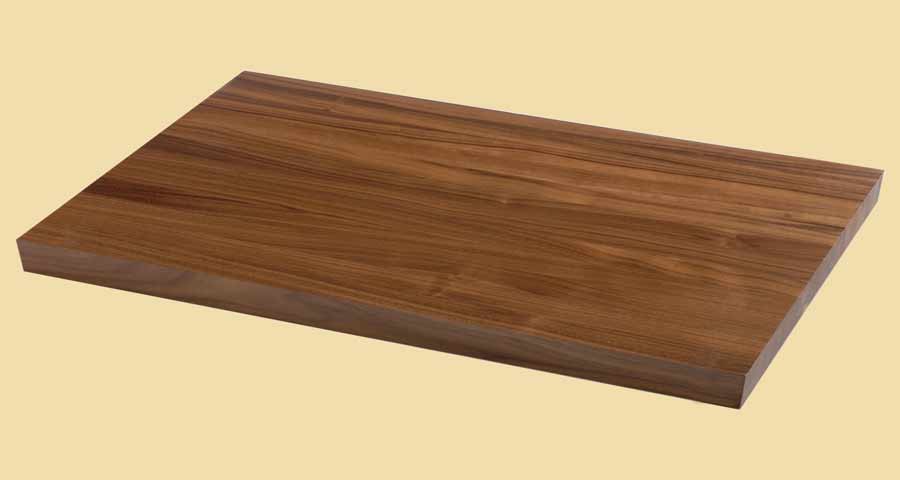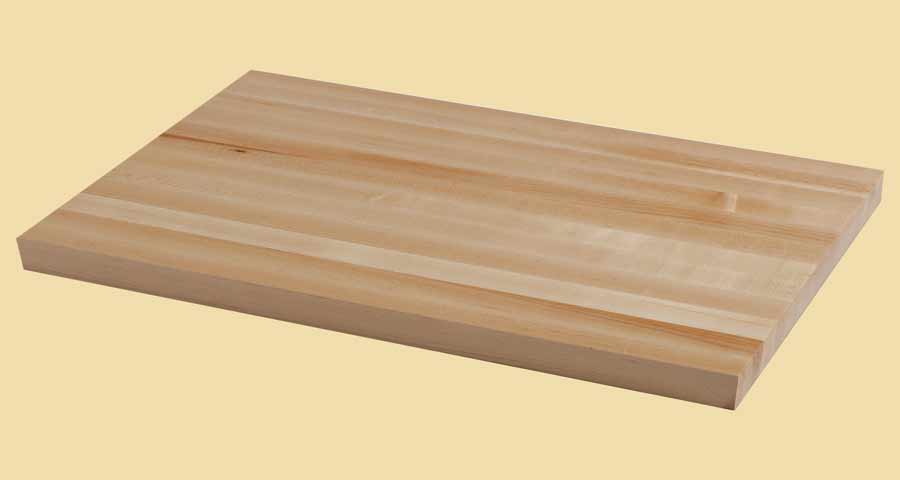Premium Quality Wood Butcher Block Countertops,
Plank Countertops and Stair Treads
15% Off All Online Orders
(Prices displayed reflect discount)
Butcher Block, End Grain and Plank Countertop: What's the Difference?Butcher block, end grain butcher block, plank countertop - what do those terms all mean? What are the differences, what are the similarities, which one is right for you? Understanding the details of how your wood product is created, and why, is an important step in choosing the style that best fits your project's needs. Each of these styles can be created from your choice of hardwoods. The difference in how the wood boards are secured to one another, and which part of the board is left uncovered, results in not only a different appearance to the final product, but also in various strengths and advantages to each. Butcher block styles - both end grain and edge grain - result in harder, more utilitarian surfaces with more color variety throughout; plank styles make gorgeous, evenly colored surfaces perfect for entertaining. Read on to learn more about all three styles, and to find the one that will be the perfect fit for you. Butcher Block With butcher block style, the wood is faced-glued, with the edge grain showing. Exposing only the edges of the boards to the outside results in a harder surface for this countertop. In fact, butcher block surfaces are hard enough to withstand heavy use and activity, including most kitchen prep, such as cutting and cooking. This is why butcher block has become such a popular material for kitchen countertops; it's a durable choice that adds warmth to the room. It is also sturdy enough to weather normal temperature fluctuations without splitting or cracking. Naturally, any extreme or quick swings in temperature can still affect a natural material such as wood. Butcher block countertops are offered in thickness up to 4-1/2", and in a wide selection of premium quality hardwoods. End Grain Butcher Block End grain butcher block is constructed by cutting 1" wide strips all varying between 1-1/2" and 6" in length, and gluing them together in a random, uneven checkerboard pattern. The end of the board faces up. The result is a fascinating blend of rustic and elegant that looks equally at home in a casual kitchen as it does in a top restaurant. This eclectic style gives your piece a one-of-a-kind appearance, ensuring a truly unique look in your kitchen. End grain butcher block is a preferred choice for professional chefs and butchers, mainly due to its remarkable durability and its ability to absorb cut marks well. The statement-making brickwork pattern is probably another reason it's a favorite of those who spend most of their time in the kitchen. End grain butcher block is available in a great selection of premium hardwoods, and can be custom-built up to 4-1/4" thick. Plank Style Plank style means that the face grain is showing, which gives a more traditional and elegant appearance to the wood. The coloring will be relatively even throughout, unlike edge grain or end grain butcher block. In plank style, the wood boards, in widths usually varying between 3" and 6", are glued side to side, resulting in a unique surface that adds interest to any room. Leaving the face grains up means that plank surfaces usually accept a stain very well, and more evenly than butcher block countertops might. As for uses, plank surfaces are often preferred for dining tables or serving surfaces. They are not as hard as butcher block constructions, so while plank surfaces can be used for light prep and serving work, they are not recommanded for use in cutting and cooking. This style surface works best in climate controlled environments. Plank countertops are available in thicknesses ranging from 1" to 1-3/4", and in a wide array of top quality hardwoods. Considering where your wood surface will be placed, and what it will most often be used for, can go a long way in informing your decision on which style of construction you should choose. There are unique strengths and benefits to each, but what they all have in common is that they are carefully, meticulously constructed from premium quality hardwoods. Whatever you choose, you will have a top-quality wood product to enjoy for years to come. |

|
 |
 |
  |
Copyright © 2024 Country Mouldings



